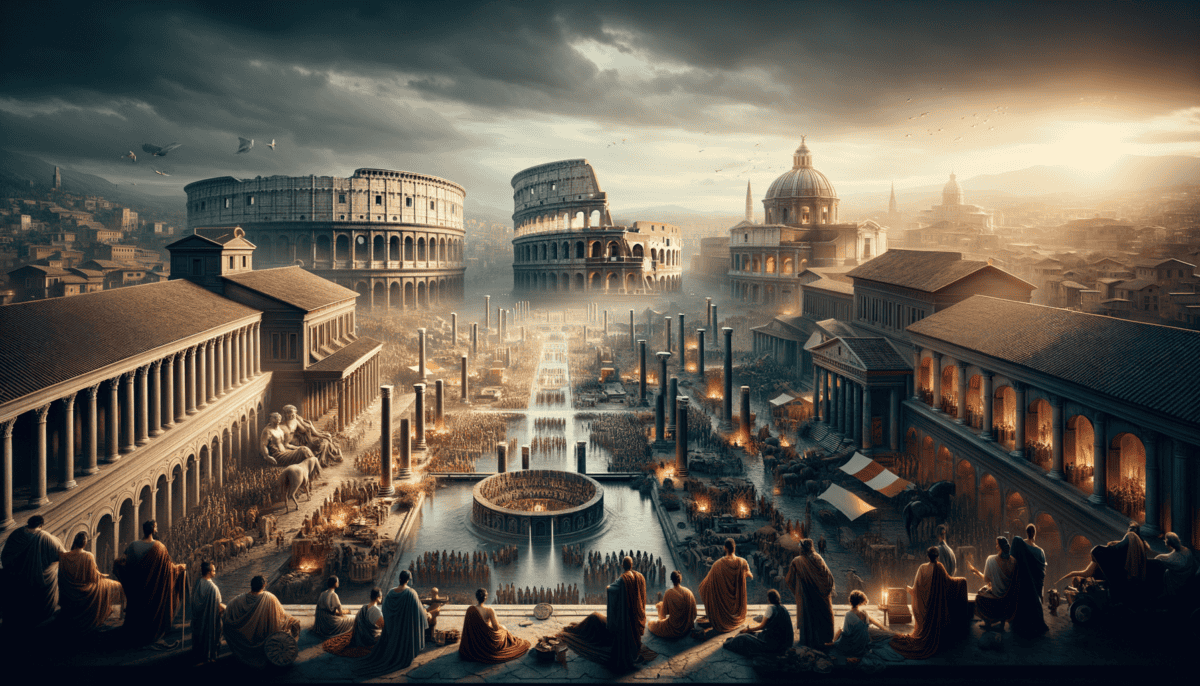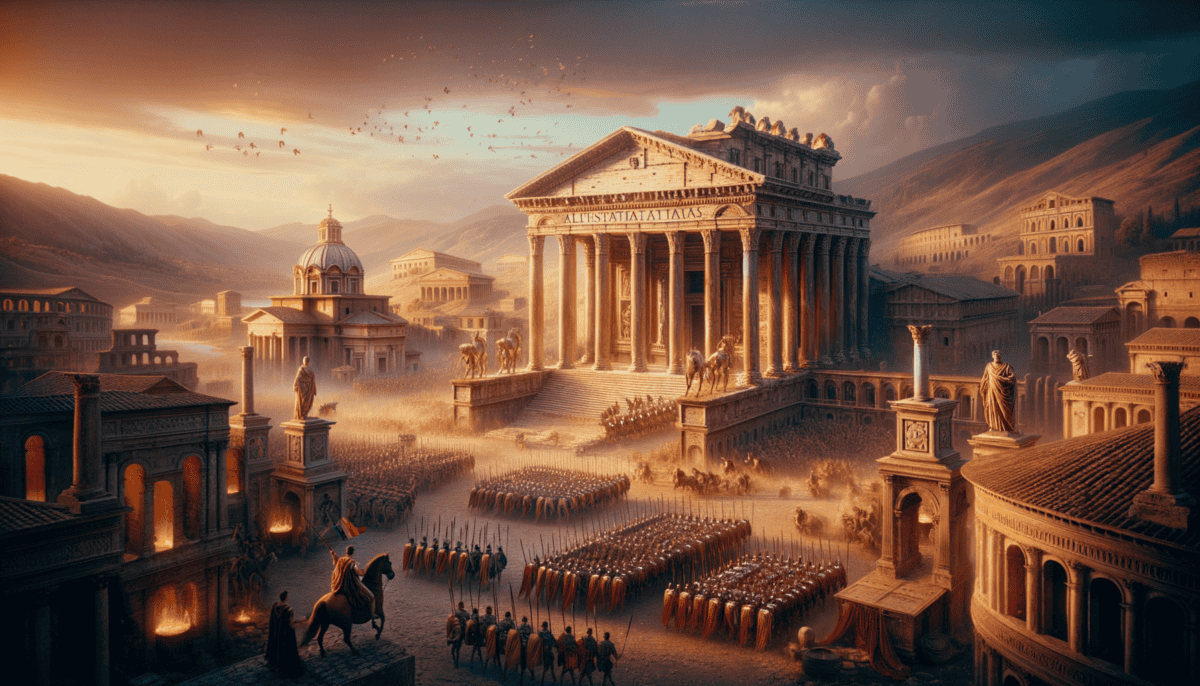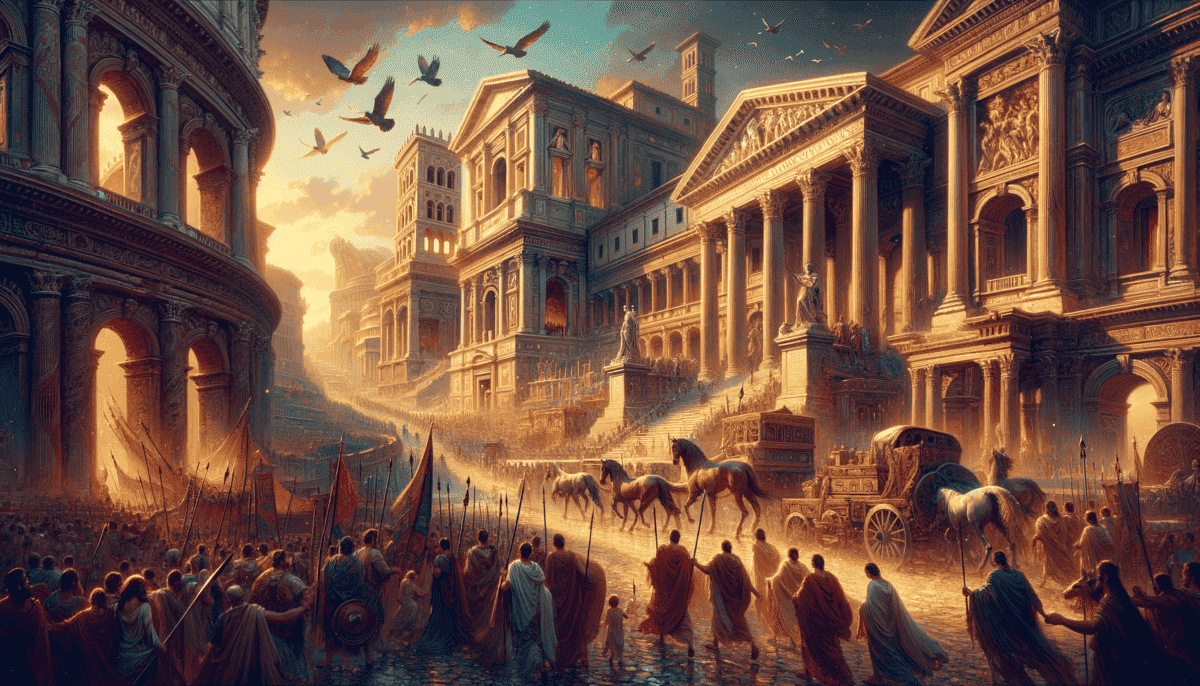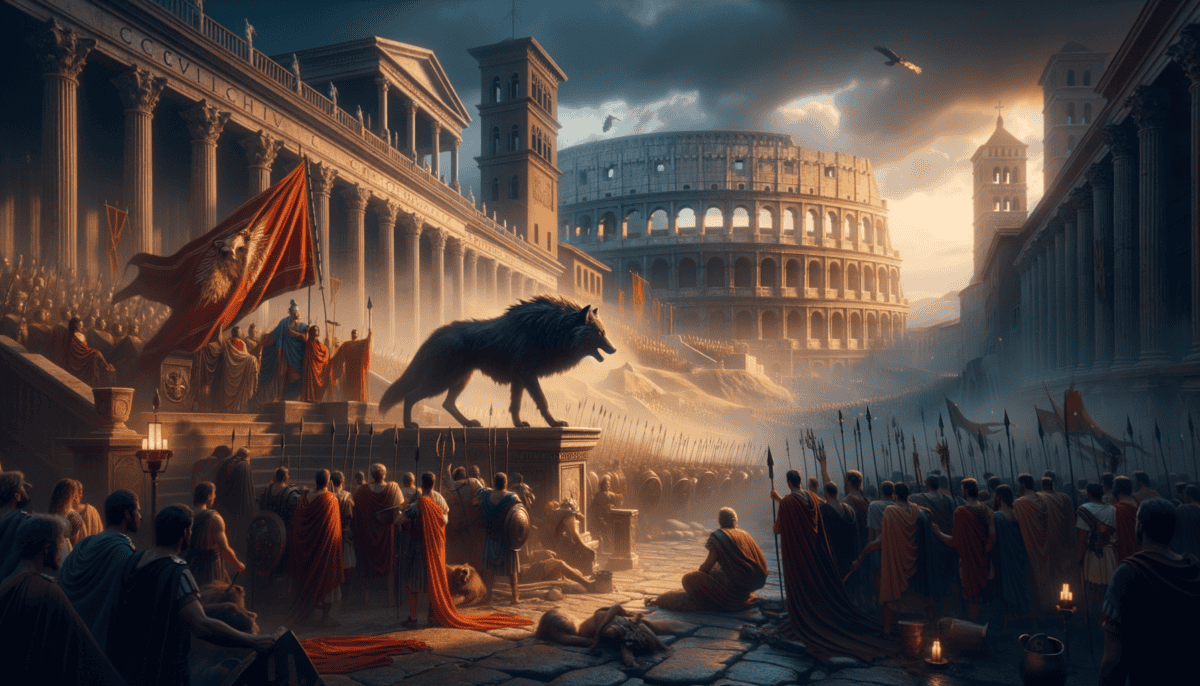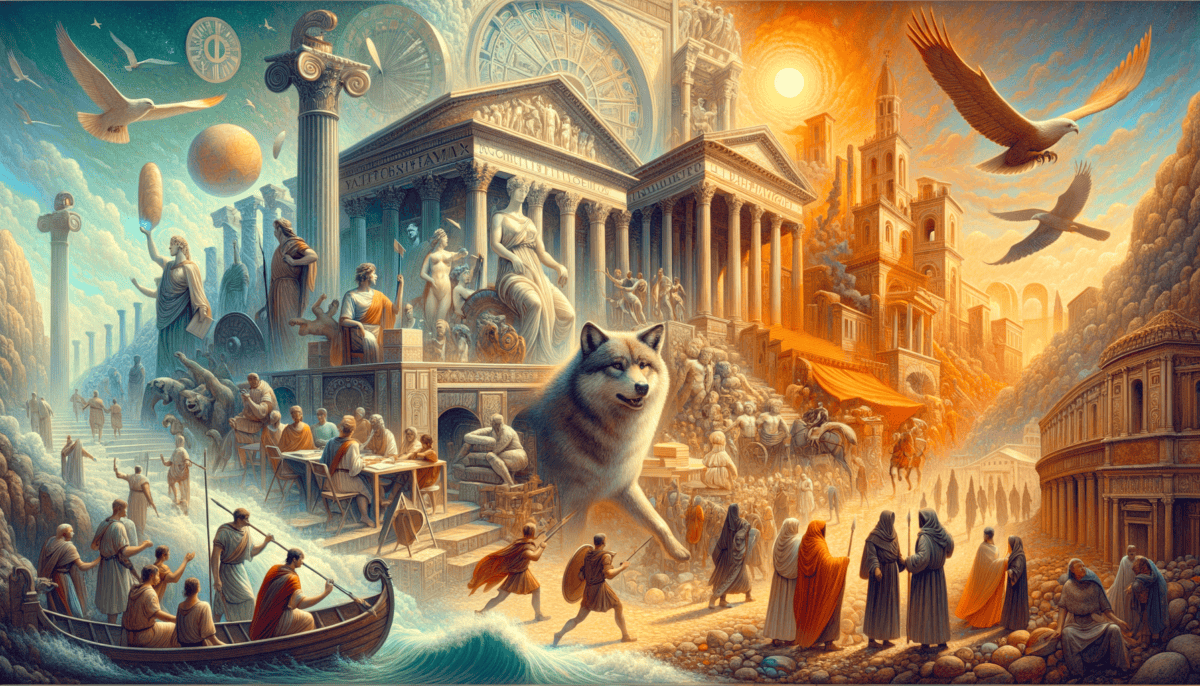A Tale of Two Brothers
Marcus sat cross-legged on the grassy hill, his eyes wide with wonder as his grandfather pointed to the seven hills surrounding them. The warm Italian sun made the ancient stones glow like gold.
"Young one," Grandfather began, his voice as warm as fresh bread, "would you like to hear how our mighty Rome began?"
"Yes, please!" Marcus bounced with excitement. He loved his grandfather's stories, especially the one about the twin brothers.
"Long, long ago, there were two special baby boys named Romulus and Remus. But their story wasn't happy at first. A mean king wanted to hurt them, so someone put them in a basket on the river Tiber."
Marcus gasped. "Were they scared?"
Grandfather smiled and continued, "The gods watched over them. The basket floated safely to shore, where a mother wolf found them. Instead of being scary, she was kind and took care of them like they were her own wolf cubs! "
Important History Box:
The story of Rome's beginning happened around 753 BCE, but people still tell it today!
"The wolf fed them and kept them warm in her cave. Later, a shepherd named Faustulus found the boys and raised them as his own sons. They grew up to be strong and brave."
Marcus played with a blade of grass. "But then they fought, right?"
"Yes, they did. When they were grown up, they wanted to build a city. But they couldn't agree where to put it. Romulus liked this hill." Grandfather patted the ground beneath them. "It's called Palatine Hill. Remus wanted to build on a different hill."
The old man's face grew serious. "They decided to let the gods choose. Each brother watched for special birds that would be a sign. Romulus saw twelve eagles, while Remus only saw six. This meant Romulus would build the city."
"And that's how Rome started!" Marcus jumped up, pretending to be Romulus building walls.
"Not quite yet," Grandfather chuckled. "Remus was angry. He jumped over the walls Romulus was building to show they weren't good enough. This made Romulus very mad, and…" He paused.
"What happened next?" Marcus whispered.
"Romulus got so angry that he… hurt his brother. It was very sad. But from that day, Romulus worked hard to build our city. He invited people from all around to come live here. Some were farmers, some were traders, and some were people who needed a new home."
Here are the important things that helped Rome grow:
- Strong walls for protection
- Good farm land for food
- The Tiber River for water and trade
- Brave people who worked together
"The city grew bigger and bigger," Grandfather spread his arms wide. "More people came. They built houses, shops, and temples. Romulus made laws to keep everyone safe and happy."
Marcus looked at the busy city below them. "And now it's the biggest city in the whole world!"
"That's right," Grandfather nodded proudly. "From two little babies in a basket to this mighty city. That's why we say Rome wasn't built in a day. It took time, hard work, and lots of brave people working together."
Marcus stood tall, puffing out his chest. "I'm going to help make Rome even better when I grow up!"
"I know you will," Grandfather said, ruffling Marcus's hair. "Every Roman has a part to play in our city's story."
The sun was setting now, painting the sky in beautiful oranges and purples. Below them, the city of Rome buzzed with life – people walking home from the markets, children playing in the streets, and temple bells ringing for evening prayers.
Marcus took one last look at the mighty walls that Romulus had built. He could almost see the brave wolf mother watching over her special babies, and the young Romulus dreaming of the great city that would one day stand here.
Throughout the city, parents were telling their children the same story, keeping alive the tale of how a tiny settlement grew into the heart of a mighty civilization. The adventure was just beginning.
The People Take Power
Marcus raced through the bustling Forum, dodging between market stalls and toga-clad citizens. His grandfather’s words from yesterday still rang in his ears as he watched a group of senators climb the steps to their meeting hall. ️
“Look there!” his friend Julia pointed. “The senators are gathering for something important.”
“Our city has changed so much,” an old fruit seller told them. “When I was young, we had kings who ruled everything. Now the people have a voice!”
Marcus and Julia sat on the warm stone steps, watching the busy scene. A wise-looking teacher named Flavius noticed their curiosity and sat beside them.
“Would you like to hear how Rome changed from having kings to letting the people help rule?” Flavius asked.
“Yes, please!” the children chorused.
“Well,” Flavius began, “long ago, Rome had kings who made all the rules. The last king was named Tarquinius Superbus. But he was not a good king – he was mean and selfish.”
Julia frowned. “What did he do?”
“He hurt people and took things that weren’t his. The Romans got very angry. A brave man named Lucius Junius Brutus said, ‘We don’t need kings anymore! The people should help make decisions!'”
Marcus’s eyes grew wide. “Was there a big fight?”
Flavius nodded. “The people worked together to send the bad king away. Then they made something new – the Republic. Instead of one king, they chose two leaders called consuls. They would rule together for just one year.”
Important Changes in Rome:
• Regular people got to vote
• Laws were written down for everyone to see
• Leaders had to share power
• No more kings forever!
“Look!” Julia pointed to a group of people gathering near the Senate house. “What are they doing?”
“Ah,” Flavius smiled, “they’re voting! In our Republic, citizens help choose their leaders. See those clay tablets they’re holding? Those are their votes.”
A tall senator in a bright white toga walked past them. “Good morning, young citizens!” he called out cheerfully. “Are you learning about our great Republic?”
“Yes, sir!” Marcus replied proudly. “I can’t wait until I’m old enough to vote!”
The senator chuckled. “And what would you vote for, young man?”
Marcus thought for a moment. “I would vote to build more schools, so everyone can learn like we are!”
“A wise choice,” the senator nodded approvingly. “That’s what makes our Republic strong – when people think about what’s good for everyone, not just themselves.”
Flavius pointed to the soldiers marching nearby. “See our army? In the old days, only rich people could be soldiers. But now, any brave Roman can join. That’s how we’re growing stronger and bigger.”
Julia watched the soldiers with shining eyes. “My brother just joined the army! He says Rome is getting bigger every day.”
“That’s right,” Flavius agreed. “Our armies are very good at fighting, but we’re also good at making friends. When we meet new people, we share our ways with them, and they share theirs with us.”
As the sun climbed higher, more people filled the Forum. Merchants sold their goods, judges heard cases, and citizens debated the issues of the day. The air buzzed with the sound of democracy in action.
Marcus stood up and pretended to be a consul. “I declare free bread for everyone!” he announced grandly.
Julia giggled. “You can’t just decide things by yourself anymore, remember? You need to ask the Senate and the people!”
Flavius beamed at them. “You’re learning well! Remember, in our Republic, power comes from the people. We all work together to make Rome great.”
The children watched as more voters streamed into the Forum. Their city was growing and changing, but one thing stayed the same – the people of Rome were building their future together.
Warriors of the Sea and Land
The salty breeze swept across the Roman harbor as Marcus watched the massive warships bobbing in the waves. His father, a naval commander, stood proudly at his side.
“Look there, son,” Commander Claudius pointed to the horizon. “That’s where Carthage lies, across the great sea.”
“Our ships are the strongest in the world now,” he said. “But it wasn’t always that way. Would you like to hear how Rome became masters of the sea?”
Marcus nodded eagerly as they walked along the dock. The wooden planks creaked under their feet as sailors rushed past with ropes and supplies.
“Years ago,” Claudius began, “Carthage ruled these waters. Their ships were the fastest, their sailors the best. But Rome needed to protect our people and trade.”
“What did we do, Father?”
“Something amazing! We found a Carthaginian ship that had crashed on our shore. Do you know what our clever builders did?”
• They copied the ship’s design
• Made it stronger with a special bridge
• Added metal spikes
• Trained soldiers to fight on water
• Built 100 ships in just 60 days!
“Look here,” Claudius led Marcus to a ship model. “See this wooden bridge with spikes? We call it a corvus. It lets our soldiers run onto enemy ships!”
A gruff old sailor named Rufus hobbled over. “Aye, I remember the first time we used those bridges against Carthage. They never saw it coming!”
Marcus touched the model carefully. “Were you scared, Rufus?”
“Scared? Ha! We Romans aren’t just good sailors – we’re the best fighters on land too! When that bridge dropped, we fought just like we do on solid ground.”
Claudius smiled. “That’s right. Our legions are special because they work together. Each soldier knows exactly what to do.”
They watched as a group of legionaries marched past in perfect formation, their red capes swaying.
“See how they move as one?” Claudius explained. “That’s why we win battles. Everyone has a job, and everyone helps each other.”
A messenger ran up to them, out of breath. “Commander! News from Sicily – another victory!”
Marcus bounced excitedly. “Did we use the special bridge, Father?”
“Indeed we did! And now more lands join Rome. But you know what makes me most proud?” Claudius knelt beside his son. “We don’t just conquer – we welcome new friends. Their ideas make Rome even better.”
As the sun set, turning the sea to gold, Marcus watched more ships sail into the harbor. Some carried soldiers, others brought treasures and new things from far away.
“Father,” Marcus asked, “will I command ships someday too?”
Claudius ruffled his son’s hair. “Perhaps. Or maybe you’ll lead armies, or build great things, or teach others. Rome needs all kinds of brave people to grow stronger.”
The evening sky filled with the sounds of seabirds and sailors’ songs. Marcus imagined Roman ships sailing to distant shores, carrying not just soldiers but also ideas, art, and friendship.
“What’s the most important thing about being Roman?” Marcus asked.
“Being strong?” guessed Rufus.
Claudius shook his head. “No, it’s learning from others and sharing what we know. That’s how Rome grows – not just by winning battles, but by making the world better.”
The Rise of Augustus
The marble halls of the Roman Senate echoed with excited whispers. Young Julia pressed her ear against the cool stone wall, trying to hear what the grown-ups were discussing. ️
“What’s happening?” she whispered to her cousin Marcus.
“Uncle Octavian is becoming something new – they’re calling him Augustus now!”
“The Senate gives to Octavian Augustus the power to protect Rome and bring peace to our lands,” a loud voice announced from inside.
The children watched as their uncle emerged from the Senate wearing a purple toga trimmed with gold. His smile was warm as he spotted them hiding behind a column.
“Come here, little ones,” Augustus beckoned. “Would you like to see something special?”
• Built beautiful marble buildings
• Created firefighters and police
• Made sure everyone had food
• Brought peace after many wars
• Started schools for children
Augustus led them to a giant map of Rome spread across a table. “See how our city looks now? But watch this…” He unrolled another map showing new designs.
“I found Rome built of brick,” he told them, “and I will leave it dressed in marble.”
Julia’s eyes widened. “The whole city will be marble?”
“Much of it! And look here…” He pointed to drawings of new buildings. “Theaters for plays, temples for prayers, and forums where people can meet and talk.”
A group of workers hurried past, carrying tools and plans. Rome was changing every day. Where wooden houses once stood, grand buildings now reached toward the sky.
“Uncle,” Marcus tugged at Augustus’s toga, “why do we need such big buildings?”
Augustus sat on a nearby bench, gathering the children close. “Rome isn’t just a city anymore – it’s the heart of a great empire. People come here from all over the world to trade, learn, and live together.”
“Like my friend Claudia!” Julia exclaimed. “Her family came from Greece!”
“Exactly! And they brought their ideas about art and science with them. That’s what makes Rome special – we learn from everyone.”
As they walked through the city, Augustus showed them new aqueducts bringing fresh water, schools where children studied, and markets full of foods from distant lands.
“But what makes me happiest,” Augustus said, watching people go about their day peacefully, “is seeing Romans smile again. No more fighting in the streets. No more worried faces.”
That evening, Julia and Marcus sat on a rooftop, watching the sun set over their changing city. Marble gleamed golden in the fading light, and the sound of music drifted up from a nearby theater.
“Do you think Rome will always be this beautiful?” Julia asked.
Marcus nodded. “Uncle Augustus says as long as we work together and stay strong, Rome will keep growing bigger and better.”
Below them, couples strolled through new gardens, scholars debated in columned halls, and artists carved stories into stone. Rome wasn’t just getting bigger – it was becoming more magnificent than anyone had ever dreamed.
“Look!” Julia pointed to a group of children playing nearby. Some had dark skin, others light. They spoke different languages but laughed together as friends.
“That’s what Uncle means,” Marcus realized. “Rome is strong because everyone brings something special to make it better.”
Cracks in the Empire
Marcus sat at his window, watching soldiers march through Rome’s streets. Something felt different today. The usual golden shine of the city seemed dimmer. ️
“Why are there so many soldiers, Father?” Marcus asked.
His father sighed, setting down his scrolls. “The empire has grown too big, my son. It’s harder to protect all our lands.”
• Too many lands to watch over
• Not enough money for soldiers
• People fighting over who should be emperor
• Farms making less food
• Roads and buildings getting old
Through the streets, Marcus could see changes. Some fountains no longer flowed with fresh water. The marble steps of the forum had cracks. Even the mighty aqueducts needed fixing.
“Remember the stories about Augustus?” Marcus asked. “When everything was new and shiny?”
“Yes, those were golden days,” his father nodded. “But keeping an empire strong takes more than just building pretty things.”
A messenger rushed in, out of breath. “Senator, more news from the borders. The Germanic tribes are pushing closer.”
Marcus watched his father’s worried face as he read the message. Outside, a group of citizens argued about grain prices in the market.
“Why can’t we just make more money?” Marcus asked, seeing people counting their coins carefully.
“It’s not that simple,” his father explained. “When we make too many coins, each one is worth less. That’s why bread costs more now.”
Julia appeared at their door, her face serious. “Uncle says the eastern provinces want to split away. They say Rome is too far to rule them properly.”
That evening, Marcus walked with his father through the city. They passed buildings with fading paint and broken tiles. Workers argued about unpaid wages.
“Father, can’t we fix everything like Augustus did?”
“The empire is like a big family, Marcus. When it was smaller, it was easier to take care of everyone. Now, with so many people in so many places, it’s harder to keep everyone happy.”
A group of senators huddled near the forum, talking in worried whispers. “We need two emperors,” one said. “One for the east, one for the west.”
Marcus turned to his father. “Will splitting the empire help?”
“Perhaps. The eastern half speaks Greek more than Latin now. They have different ways, different needs. Sometimes letting go of something helps save it.”
That night, Marcus looked at his family’s old map of the empire. It stretched from Britain to Egypt, from Spain to Syria. He thought about how hard it must be to protect and care for so many different places.
“Rome isn’t falling,” his father assured him, seeing his worried face. “It’s changing. Just as it changed from a tiny village to a republic, and from a republic to an empire. Change isn’t always easy, but it’s part of life.”
Marcus touched the cracks in his window sill. Maybe the empire was like this marble – still strong, but showing signs of age. The real question was: could Rome learn to bend without breaking?
The Last Sunset
Marcus stood on the Palatine Hill, watching Rome’s sunset paint the sky in beautiful colors. The year was 476 CE, and everything was about to change.
“Look, Julia! The sky matches the stories Father used to tell about Rome’s greatest days,” Marcus called to his sister.
Julia smiled sadly. She was no longer the young girl who once raced through the forum. “Those were different times, brother. Now even our emperors hide in Ravenna instead of ruling from Rome.”
A crowd gathered below in the forum. People whispered about Odoacer, the barbarian general who now controlled Italy’s armies. The air felt heavy with worry.
The Western Empire was fading, but its ideas lived on through:
• Its laws and language
• Its beautiful buildings
• Its stories and art
• Its roads and cities
• Its many inventions
“Do you remember when Father taught us about Augustus?” Marcus asked, touching an old column. “He said empires are like trees – they grow, change, and sometimes make way for new things to grow.”
Suddenly, horns blasted through the city. Odoacer’s soldiers marched through the streets. The last Roman emperor, young Romulus Augustulus, had given up his crown.
“What happens now?” Julia whispered.
Marcus watched as monks carefully carried scrolls from the library. “The stories won’t die, sister. Look – they’re saving our books, our ideas, our history.”
In the eastern empire, Rome’s spirit stayed strong. Constantinople glittered like a jewel, keeping Roman culture alive. New kingdoms grew from Roman roots, learning from its successes and mistakes.
Years later, Marcus taught his own children about Rome’s legacy. “The empire may have changed,” he said, “but its gifts are everywhere. Our laws, our language, our love of learning – these things will live forever.”
He showed them the old family map, now faded but still beautiful. “Rome taught us that great things take time to build. And even when they change, they leave behind wisdom for the future.”
The children traced the old Roman roads on the map. “These paths still connect people today,” Marcus explained. “Just like Roman ideas still connect us to the past.”
Julia joined them, carrying old family scrolls. “And look here – stories of brave people, clever inventors, and wise leaders. These lessons help us build better futures.”
As another sunset painted Rome’s hills, Marcus smiled. The empire had changed, but its spirit lived on in countless ways – in the roads people traveled, the words they spoke, and the dreams they shared.
Rome’s greatest gift wasn’t its power or its glory. It was the idea that people from different places could work together, learn from each other, and build amazing things. That idea would never fade.
And so, as new kingdoms rose from Roman foundations, they carried forward the best parts of what Rome had taught them – about law and learning, about building and dreaming, about falling and rising again.
The sun finally set on the Western Roman Empire, but its light never truly went out. It still shines today in every library, every courthouse, and every place where people come together to build something lasting.
Marcus held his children close. “Remember,” he said softly, “great things never really end. They change and grow into new great things. That’s Rome’s true victory.”


